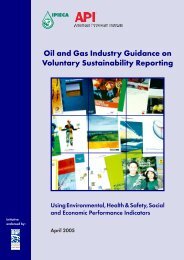Why gender matters - Centre for Social Responsibility in Mining ...
Why gender matters - Centre for Social Responsibility in Mining ...
Why gender matters - Centre for Social Responsibility in Mining ...
You also want an ePaper? Increase the reach of your titles
YUMPU automatically turns print PDFs into web optimized ePapers that Google loves.
Section 3 – The <strong>gender</strong>ed nature<br />
of m<strong>in</strong><strong>in</strong>g impacts and benefits<br />
We know that the effects of m<strong>in</strong><strong>in</strong>g are experienced <strong>in</strong> a variety of ways,<br />
depend<strong>in</strong>g on a person’s <strong>gender</strong>, ethnicity, age, class and a range of other<br />
factors. By properly consider<strong>in</strong>g <strong>gender</strong>, Rio T<strong>in</strong>to can work to avoid these<br />
negative impacts.<br />
Background reader<br />
This section outl<strong>in</strong>es some of these<br />
impacts, with a particular focus<br />
on women, along the follow<strong>in</strong>g<br />
thematic l<strong>in</strong>es:<br />
– negotiation and engagement;<br />
– local employment;<br />
– socio-economic and<br />
environmental aspects; and<br />
– special issues: resettlement and<br />
displacement, HIV and small<br />
scale m<strong>in</strong><strong>in</strong>g.<br />
Negotiations and engagement<br />
Involvement of local communities<br />
<strong>in</strong> the early stages of m<strong>in</strong>eral<br />
development provides an<br />
opportunity <strong>for</strong> local people to<br />
<strong>in</strong>fluence the development process.<br />
This can <strong>in</strong>clude the tim<strong>in</strong>g, nature,<br />
scale and even the location of an<br />
operation. Early negotiations also<br />
<strong>in</strong>volve identification of anticipated<br />
impacts and negotiation of benefit<br />
flows, such as compensation and<br />
other payments. However, evidence<br />
shows that women are often<br />
excluded from <strong>for</strong>mal negotiations,<br />
and also from <strong>in</strong><strong>for</strong>mal processes.<br />
While there are a number of<br />
dynamics at play, exclusion of<br />
women from engagement at the<br />
early stages of project development<br />
contributes to <strong>in</strong>equitable<br />
distribution of risks, impacts and<br />
benefits (International Institute on<br />
Environment and Development<br />
2002; Macdonald 2002).<br />
While women can be excluded<br />
from <strong>for</strong>mal negotiations, there are<br />
cases where they have used their<br />
agency to <strong>in</strong>fluence negotiations,<br />
either <strong>for</strong>mally or <strong>in</strong><strong>for</strong>mally. Just<br />
because women may not attend<br />
<strong>for</strong>mal negotiations, or have equal<br />
<strong>in</strong>fluence, this does not mean that<br />
they are passive. (O’Faircheallaigh<br />
2008).<br />
That said, women are often<br />
excluded from consultation<br />
processes, <strong>for</strong> a variety of reasons.<br />
They may not be able to attend <strong>for</strong><br />
cultural or workload reasons. Public<br />
meet<strong>in</strong>gs and other <strong>for</strong>ums may be<br />
held at times that are <strong>in</strong>convenient<br />
<strong>for</strong> women with family and<br />
domestic responsibilities. Or it<br />
may be because the women live<br />
some distance from the m<strong>in</strong>e<br />
itself. Failure to adequately engage<br />
these women also means that their<br />
knowledge is not accessed and<br />
considered <strong>in</strong> project plann<strong>in</strong>g.<br />
For example, if women are not<br />
consulted, sites that are important<br />
to women may not be adequately<br />
protected, or access <strong>for</strong> women<br />
ma<strong>in</strong>ta<strong>in</strong>ed. The exclusion of<br />
women from negotiations and<br />
compensation can exacerbate<br />
resentment and conflict with, and<br />
with<strong>in</strong>, the local communities.<br />
Local employment<br />
Direct or <strong>in</strong>direct employment<br />
with<strong>in</strong> the m<strong>in</strong><strong>in</strong>g <strong>in</strong>dustry can<br />
provide opportunities <strong>for</strong> local<br />
people to <strong>in</strong>crease their economic<br />
status, and that of their family.<br />
Employment can also <strong>in</strong>crease<br />
people’s mobility, skill level and<br />
employability elsewhere with<strong>in</strong><br />
the m<strong>in</strong><strong>in</strong>g <strong>in</strong>dustry or <strong>in</strong> other<br />
<strong>in</strong>dustries and locations. This is<br />
particularly the case where tra<strong>in</strong><strong>in</strong>g<br />
has been provided. The possibility<br />
of jobs can also motivate local<br />
people to complete education.<br />
However, it is mostly men who ga<strong>in</strong><br />
employment with<strong>in</strong> the m<strong>in</strong><strong>in</strong>g<br />
<strong>in</strong>dustry. Even today some outdated<br />
ILO conventions that prevent<br />
women from engag<strong>in</strong>g <strong>in</strong> night<br />
work and work<strong>in</strong>g underground<br />
have not been resc<strong>in</strong>ded, though<br />
their status is considered “obsolete”<br />
(Politakis 2001: 403).<br />
When men are employed <strong>in</strong><br />
waged m<strong>in</strong><strong>in</strong>g jobs, the division of<br />
labour can be significantly altered,<br />
sometimes very quickly. Empirical<br />
studies cont<strong>in</strong>ue to confirm the<br />
existence of the <strong>gender</strong> gap <strong>in</strong><br />
the m<strong>in</strong><strong>in</strong>g workplace. This sees<br />
a system that fails to recognise<br />
the “triple role” of women,<br />
signify<strong>in</strong>g their challeng<strong>in</strong>g<br />
comb<strong>in</strong>ation of work, community<br />
and domestic responsibilities. This<br />
phenomenon relates to m<strong>in</strong><strong>in</strong>g<br />
as well as many other sectors.<br />
In some communities, women<br />
face <strong>in</strong>creased workloads as they<br />
manage households and family<br />
responsibilities alone <strong>for</strong> extended<br />
periods, such as when partners<br />
are on long distance commute<br />
rosters. If men are <strong>in</strong>jured at work<br />
it is usually women who carry the<br />
burden of <strong>in</strong>jury <strong>in</strong> the domestic<br />
sphere, particularly <strong>in</strong> countries<br />
with poor health systems and<br />
services. There are opportunities <strong>for</strong><br />
companies to consider cont<strong>in</strong>gency<br />
arrangements <strong>for</strong> situations such<br />
as m<strong>in</strong>e accidents <strong>in</strong> employment<br />
contracts, particularly <strong>in</strong> vulnerable<br />
communities. When women are<br />
employed <strong>in</strong> m<strong>in</strong><strong>in</strong>g, or other<br />
<strong>in</strong>dustries, they are often expected<br />
to ma<strong>in</strong>ta<strong>in</strong> both traditional<br />
domestic and agricultural roles and<br />
83


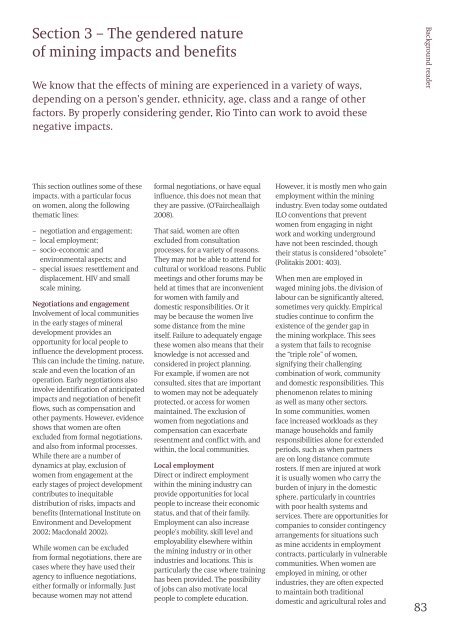

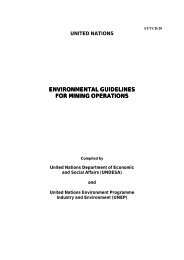
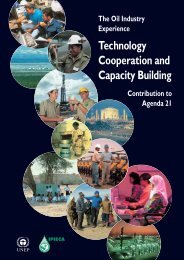
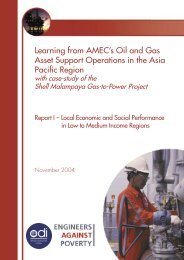
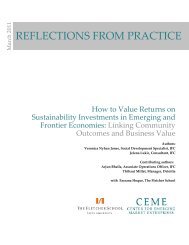
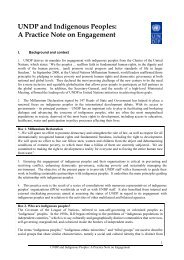
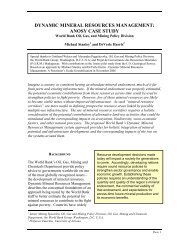
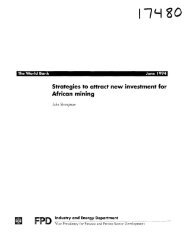

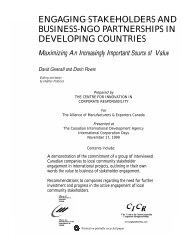
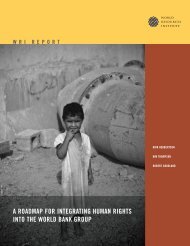


![[PDF] Community Development Toolkit - CommDev](https://img.yumpu.com/48616495/1/184x260/pdf-community-development-toolkit-commdev.jpg?quality=85)
